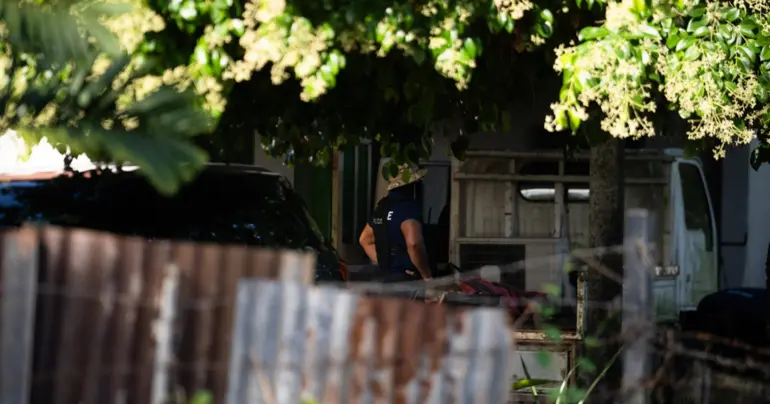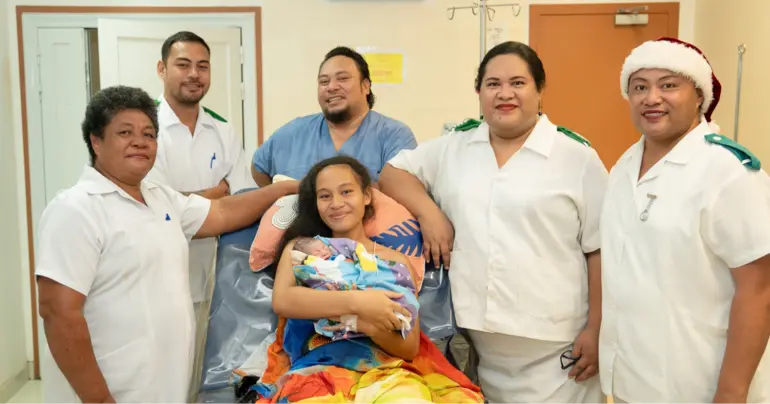New 'highly transmissible' COVID variant detected
 By Adel Fruean
•
28 November 2021, 6:57PM
By Adel Fruean
•
28 November 2021, 6:57PM
While Samoa remains COVID-19 free, a new variant, named Omicron has been detected overseas, enlivening global concerns about the spread of the pandemic.
The World Health Organisation (W.H.O.) has labeled the newly discovered strain as a "variant of concern."
The variant, named Omicron was first reported to W.H.O. from South Africa on 24, November 2021. However, the first known confirmed infection was from a specimen collected on 9 November, 2021.

But reports have revealed that cases of the new variant have been confirmed in Botswana, Belgium, Israel and Hong Kong.
The Australian Government’s Department of Health issued additional border security measures to protect Australians from the new ‘Omicron’ COVID-19 variant on 27 November, 2021.
"Anyone who is not a citizen or permanent resident of Australia, or their immediate family including parents of citizens, and who have been in African countries where the Omicron variant has been detected and spread – within the past 14 days – will not be able to enter Australia," health authorities said.
“The countries are: South Africa, Namibia, Zimbabwe, Botswana, Lesotho, Eswatini, Seychelles, Malawi and Mozambique.
“Australian citizens and permanent residents, immediate family members including parents arriving from these countries will need to go into immediate supervised quarantine for 14 days subject to jurisdictional arrangements.
“The Government will suspend all flights from the nine southern African countries for a period of 14 days as a matter of precaution.”
Furthermore, “the Omicron variant has a high number of mutations within its spike protein, which is particularly concerning.”
“There are currently no known cases of the Omicron variant in Australia.
“The actions taken by the Australian Government to date are precautionary and will remain so until more is known about the severity and transmissibility of the new variant.”
According to the latest figures from Samoa’s Health Ministry, a total of 116,838 received the first dose of the AstraZeneca vaccine accounting for 95.9 per cent of the eligible population. Of this total 60,224 were male while 56,614 were female.
A total of 102,800 Samoans and residents have been fully vaccinated which represents 84.3 per cent of the eligible population with 52,942 male and 49,858 female.
For the Pfizer vaccine a total of 23,027 people which include children from 12-17 years, pregnant mothers and lactating mothers received their first dose while 6,064 are fully vaccinated.
In a statement issued by the W.H.O. last week, the epidemiological situation in South Africa has been characterized by three distinct peaks in reported cases, the latest of which was predominantly the Delta variant.
“In recent weeks, infections have increased steeply, coinciding with the detection of [the new COVID-19] variant,” read the statement.
“This variant has a large number of mutations, some of which are concerning. Preliminary evidence suggests an increased risk of reinfection with this variant, as compared to other [variants].
“The number of cases of this variant appears to be increasing in almost all provinces in South Africa. Current SARS-CoV-2 PCR diagnostics continue to detect this variant.
“Several labs have indicated that for one widely used P.C.R. test, one of the three target genes is not detected (called S gene dropout or S gene target failure) and this test can therefore be used as marker for this variant, pending sequencing confirmation. Using this approach, this variant has been detected at faster rates than previous surges in infection, suggesting that this variant may have a growth advantage.”
Furthermore, W.H.O. has revealed that there are a number of studies underway and the TAG-VE will continue to evaluate this variant.
“W.H.O. will communicate new findings with Member States and to the public as needed," the organisation said in a statement.
“Based on the evidence presented indicative of a detrimental change in COVID-19 epidemiology, the TAG-VE has advised W.H.O. that this variant should be designated as a [variant], and the WHO has designated [the new variant] Omicron.”
This led to the W.H.O. asking countries to do the following: enhance surveillance and sequencing efforts to better understand circulating virus variants.
Countries are encouraged to perform field investigations and laboratory assessments to improve understanding of the potential impacts of the variant on COVID-19 epidemiology, severity, effectiveness of public health and social measures, diagnostic methods, immune responses, antibody neutralization, or other relevant characteristics.
“Individuals are reminded to take measures to reduce their risk of COVID-19, including proven public health and social measures such as wearing well-fitting masks, hand hygiene, physical distancing, improving ventilation of indoor spaces, avoiding crowded spaces, and getting vaccinated," the W.H.O. said.
The variant has been identified as causing significant community transmission or multiple COVID-19 clusters, in multiple countries with increasing relative prevalence alongside increasing number of cases over time, or other apparent epidemiological impacts to suggest an emerging risk to global public health.
 By Adel Fruean
•
28 November 2021, 6:57PM
By Adel Fruean
•
28 November 2021, 6:57PM











